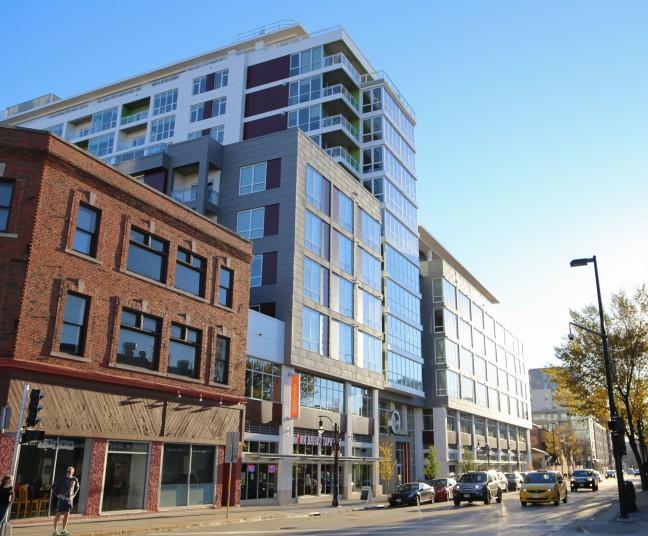Beginning in 2015, the city of Madison proposed attributing more than $7 million in affordable housing projects as part of the city’s Affordable Housing Initiative.
Recently, the city of Madison issued a request for affordable housing proposals. Four of the received proposals were granted funding Tuesday, Oct. 30.
According to the first proposal’s application, the Bayview Foundation and Horizon Development Group are contributing $29.3 million to 120 affordable housing units, 10 regular housing units and a new community center. These projects aim to replace 102 units and community center near South Park Street, Regent Street and West Washington Avenue. The city recommended $1.9 million in funding, as well as $990,000 in federal grants.
Their proposal highlights the cultural diversity of their community and is motivated by their desire to connect the tenants to affordable housing with more resources, Bayview’s Executive Director Alexis Larson said.
The application indicated its goals were to increase the supply of safe, quality, affordable rental housing throughout the city, as well as reserve existing income and rent-restricted rental housing to ensure long-term affordability and sustainability.
According to the application, Bayview already connects the community it serves with many resources.
“All 102 of Bayview’s current households are supported through a variety of services and programs, such as after school and summer camp programs for youth ages 7-18, computer and financial literacy for adults, ESL classes, health and wellness programs, and food access initiatives,” according to the application.
The next proposed development is called Schroeder Road, which includes 96 units as well as a restaurant. 81 of these units will be affordable housing, 20 of which specifically geared towards veteran households and previously homeless households, with support services available. Schroeder Road requested $2 million from the city of Madison, according to their application, and they were recommended $1.85 million.
According to project advisor and president of Stone House Development Helen Bradbury, the location off of Schroeder Road, on Madison’s Southwest side is ideal because of the access to community services it can provide.
“We chose this site as it is located in a Preferred Area of the Affordable Housing Targeted Area Map and will bring a mixed range of affordable and market-rate housing to a location in the city that is near many established neighborhoods with close access to transportation and daily living resources like full service grocery, schools, parks and community service centers, such as the YMCA,” Bradbury said.
The third development proposed is called Valor on Washington. It is intended specifically for veterans and their families and will include 59 apartments. The bottom floor, however, is intended as an area for recreation and peer support. It will include a fitness room, coffee shop, and other spaces for veterans to connect with their peers. 50 of the units will be made affordable to families at or below 60 percent the median income. The city is recommending them $950,000.
The support spaces on the first floor will be developed by a nonprofit called Dryhootch. Gorman USA, Valor on Washington’s developer, commented on the value of service proximity for residents.
“[Dryhootch’s] mission is to create safe, comfortable places where Veterans can gather informally in a drug- and alcohol-free environment,” Gorman USA stated in their application. “The affordable apartments located above the Dryhootch space will be targeted to Veterans and their families, offering a unique opportunity for Veterans to live and have a peer support network within the same building. Dryhootch services will be available to Valor residents as well as other Veterans within the community.”
The other housing development is called Ace Apartments, whose proposal included a 70 unit mixed-income apartment complex, located east of downtown Madison.
Sixteen of the units will be available to tenants below 30 percent of the area median income level, and 11 will be restricted to tenants below 80 percent of the median income. Two organizations, Movin’ Out and Mirus Partners are working together to develop Ace Apartments, and they plan to offer services to veterans and low-income families. They were recommended by the city $1.4 million in city funds and $1.29 million in federal funds. They requested $2 million.
Community Development and Grants Supervisor for the city of Madison Linette Rhodes said the city sets aside funds every year for low-income housing. They also distribute Low Income Housing Tax Credits to eligible developments and have committed up to $4.5 million annually to support low-income housing projects.
“Our goal is to use those funds to leverage other funding resources, such as LIHTC, to support these developments,” Rhodes said.
The LIHTC credit will be awarded in spring 2019 with construction likely beginning within the next year, Rhodes said. If everything goes as scheduled, the units should finish by 2021.
For tenants to have success and access to community resources in the developing units, the city must pay attention to the proposed location of each development, Rhodes said.
“We request information on the distance to schools, child care, libraries, community centers, medical clinics, etc. One site preference is the proximity to a full-service grocery store,” Rhodes said. “Our goal is to ensure that new housing developments are in areas where renters have close access to these resources.”
Though the specific demographic served in each of these developments may vary by factors like DCMI, Rhodes said it will be up to the developers to restrict rent in accordance with their proposals. It will also be up to developers to follow through when providing support services.
Overall, the developments will likely stand in contrast to increasing rent prices across the city. As Madison’s population has begun to outpace its housing surplus, Rhodes said housing demand has risen and vacancy has fallen.
“The goal of these developments is to increase the supply of safe, quality, affordable rental housing in the city of Madison,” Rhodes said.


